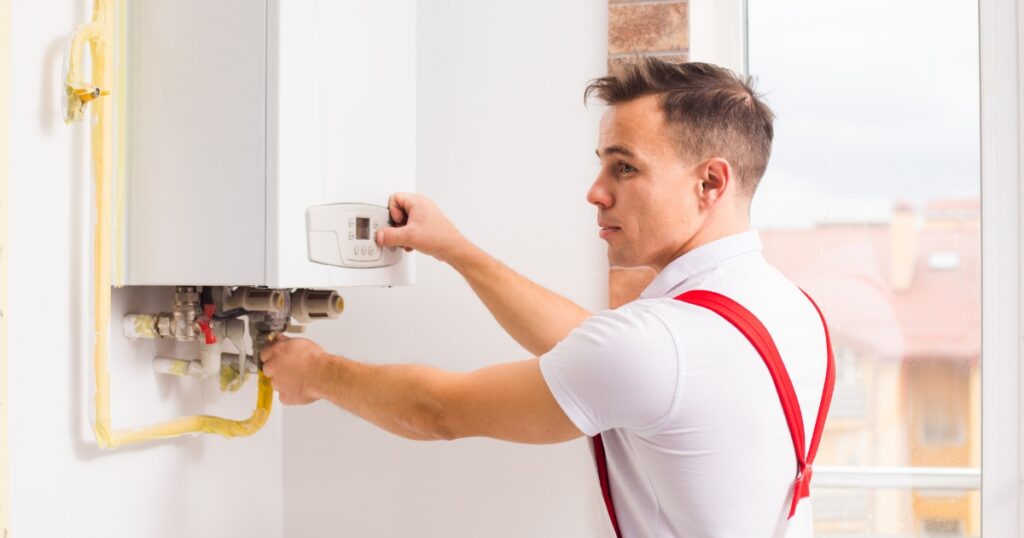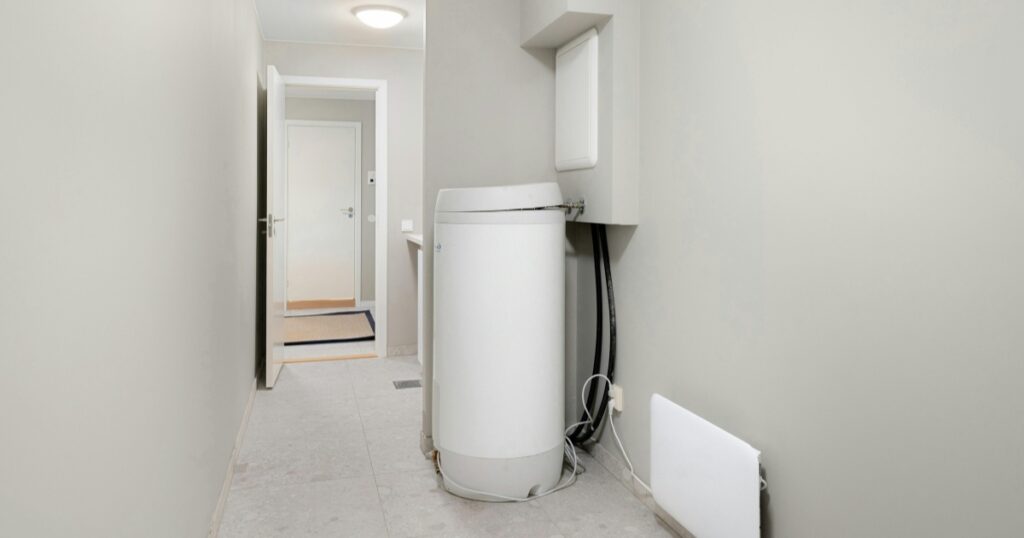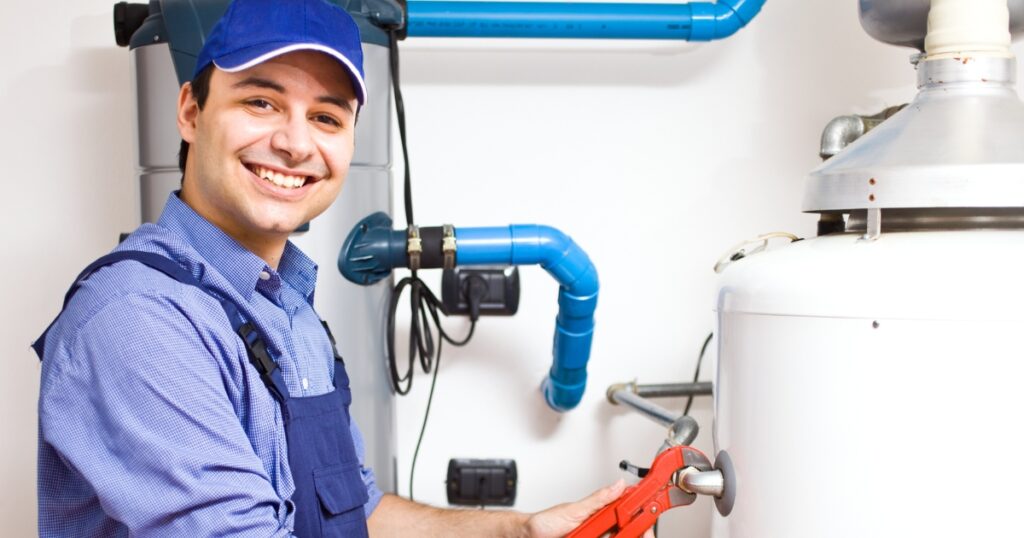Choosing the right hot water system can be as crucial as picking the perfect mattress for a good night’s sleep – you don’t fully appreciate its importance until you’re up the creek without a paddle.
We’ve all had that sudden, shocking cold surprise in the middle of what was meant to be a relaxing shower, haven’t we? That’s exactly why we’ve done our homework, plumbing the depths to get our heads around how different systems tick and what perks they bring to the table.
Our guide is chock-a-block with info on costs, efficiency and maintenance, laying it out in plain English so you can pick your new hot water system with confidence – no worries about regretting your choice later. So go on then, have a read; this might just warm your heart (and home) quicker than a cuppa by the heater!
Key Takeaways
- Hot water systems come in various types including electric, gas, solar, and heat pump options; each with unique features to match household needs.
- Energy efficiency and cost-effectiveness are key factors when choosing a hot water system, with government incentives available for eco-friendly choices like solar and heat pumps.
- Household size and daily water usage greatly influence which hot water system is best suited; larger families may benefit from continuous flow gas or efficient heat pump systems.
- High energy star ratings on hot water systems indicate better energy savings over time, leading to lower operational costs.
- Regular maintenance of your hot water system can extend its lifespan, improve efficiency and prevent unexpected repairs.
Types of Hot Water Systems
There are several types of hot water systems available, including electric, gas, solar, and heat pumps. Each type has its unique features and benefits that cater to different household needs.

Electric
Electric hot water systems are pretty straightforward, working much like a giant kettle. An element inside the tank heats the water, and we can easily control the temperature. Rheem Hot Water is a popular choice for these electric storage tanks, but they do offer other types as well such as gas and heat pumps.
We find that electric models provide hot water reliably, making them a favourite in many homes. They’re especially suitable when solar or gas options aren’t viable. These systems come in various sizes to suit any household need – whether you live alone or with a big family where plenty of hot showers are essential.
Plus, understanding your home’s energy consumption will help you pick just the right size to keep those bills down.
Gas
Gas hot water systems use natural gas or LPG to heat water in a storage tank. The gas burner heats the water, and the heated water is stored until needed. Gas hot water systems are known for their fast recovery times, providing plenty of hot water for larger households.
They are also energy-efficient and cost-effective, making them a popular choice for many homeowners. Rheem Hot Water offers a range of gas water heaters that provide reliable performance and high energy efficiency, ensuring that your household’s hot water needs are met efficiently.
Gas hot water systems offer continuous supply without the need to wait for more hot water to be heated up in the tank, like with electric storage systems. Additionally, they are often considered more environmentally friendly than electric options due to lower greenhouse emissions.
Solar
Solar hot water systems use the sun’s energy to heat water for your home. They are an eco-friendly option that can help reduce your household’s carbon footprint and lower energy bills.
With active solar hot water systems, rooftop collectors absorb sunlight to heat the water in a storage tank, providing a sustainable and efficient way to meet your hot water needs.
Government incentives for solar hot water systems may be available, making them an attractive choice for homeowners looking to make environmentally conscious decisions while also saving money on their utility costs.
Heat Pump
Moving on from solar hot water systems, another option to consider is the heat pump. A heat pump hot water system operates by using electricity to move heat from one place to another instead of generating heat directly like a traditional electric storage system.
This makes it a more energy-efficient choice as it can produce up to three times more energy than it consumes. Additionally, some government incentives and rebates may be available for installing a heat pump system, making it an attractive choice for environmentally conscious homeowners.
When comparing different types of hot water systems, remember that factors such as cost, energy efficiency, durability, and maintenance should all play a role in your decision-making process.
Comparing the Types of Hot Water Systems
When it comes to comparing the types of hot water systems, there are several factors to consider such as cost, energy efficiency, durability, and maintenance. To learn more about which hot water system is best for your home, keep on reading!
Cost
Understanding the cost of different hot water systems is essential for us as homeowners—it’s not just about the initial purchase price, but also the ongoing operating expenses. Let’s break down the costs associated with each type of system in a simple table:
| Type of Hot Water System | Initial Cost | Ongoing Costs |
|---|---|---|
| Electric | Lower upfront cost than some other systems | Higher running costs due to electricity prices |
| Gas | Moderate initial cost | Lower operating costs than electric, dependent on gas prices |
| Solar | Higher initial investment | Minimal running costs, relying mostly on sun’s energy |
| Heat Pump | Higher upfront cost than conventional electric systems | Significantly lower running costs, more efficient than standard electric heaters |
Electric systems like those from Rheem Hot Water may have a lower purchase price, but we should brace for the ongoing electricity bills. Gas systems strike a balance, offering moderate upfront costs and generally cheaper running expenses. Solar options demand a larger initial outlay, yet they promise to pay us back with minimal ongoing costs, thanks to the sun’s free energy. Heat pumps, although pricier to install, run far more efficiently, leading to greater savings over time. We should always consider government rebates and incentives that could sweeten the deal for more efficient systems.
Energy efficiency
We’ve looked at the cost of different hot water systems, and now let’s consider their energy efficiency. Electric hot water systems tend to be less energy efficient compared to heat pumps or solar options. Heat pump water heaters can produce up to three times more energy than they consume, making them highly efficient. Solar hot water systems also offer excellent energy efficiency by harnessing the power of the sun to heat your water, reducing reliance on traditional electricity sources.
Gas hot water systems usually have a lower upfront cost but may incur higher operating costs due to gas prices. Instantaneous or continuous flow hot water systems are generally more energy-efficient than storage systems as they only heat water when needed, eliminating standby heat losses. When choosing a new system, it’s essential to consider its long-term operational costs and potential savings through government incentives for installing an environmentally friendly and energy-efficient option.
Durability
Considering the longevity of hot water systems is crucial when making a decision. Each type has its lifespan, which can be affected by factors such as maintenance and usage. Manufacturers may offer warranties that indicate their confidence in the durability of their products. Understanding the expected durability of different hot water systems will help homeowners make informed decisions about which type best suits their needs and budget.
It’s important to remember that regular maintenance can significantly impact the lifespan of your hot water system, regardless of its initial durability rating. Neglecting maintenance can lead to premature failure, while proper care and attention can extend the life of your investment.
Maintenance
Maintenance of hot water systems is crucial to ensure optimal performance and longevity. Regular checks on the heating elements, thermostat, and pressure relief valve are essential to prevent malfunctions. It is important to flush out sediment buildup in storage systems annually and schedule professional inspections for gas or solar systems every few years. For electric hot water tanks, monitoring the anode rod’s condition can help prevent corrosion and extend the system’s lifespan.
Understanding the maintenance requirements of different hot water systems can help homeowners keep their units running smoothly. By staying proactive with regular upkeep, it is possible to avoid costly repairs and maintain efficient operation throughout the system’s life cycle.

Factors to Consider When Choosing a Hot Water System
When choosing a hot water system, it’s important to consider factors such as your household size and water usage, Energy Star ratings, and the availability of rebates and incentives.
Household size and water usage
Considering the size of your household and your daily water usage is crucial when selecting a hot water system. The number of people in your home directly impacts the demand for hot water, influencing which type of system would best suit your needs.
Smaller households with minimal usage may find an electric storage hot water system sufficient, while larger families or homes with high water consumption might benefit from a gas or heat pump system to meet their demands effectively.
Understanding your household size and typical water usage patterns will aid in determining the most suitable hot water system for optimal efficiency and cost-effectiveness.
Energy star ratings
Energy star ratings are crucial when considering a hot water system. These ratings indicate the energy efficiency of different systems, helping homeowners make informed decisions about their purchases.
Systems with higher energy star ratings consume less power, which can lead to significant cost savings on utility bills over time. By choosing a hot water system with a high energy star rating, you not only save money but also contribute to environmental conservation by reducing your home’s carbon footprint.
Considering energy star ratings is essential for selecting an eco-friendly and cost-effective hot water system that meets your household’s needs for reliable access to hot water. With various options available in the market, understanding these ratings will guide you towards making an informed decision that aligns with both your budget and sustainability goals.
Rebates and incentives
To encourage the uptake of energy-efficient hot water systems, the government offers rebates and incentives to help offset the initial cost. These incentives can vary depending on your location and the type of system you choose, with many focusing on solar or heat pump models.
By taking advantage of these programs, homeowners can not only save money upfront but also benefit from ongoing energy savings and reduced environmental impact.
One key consideration when evaluating rebates and incentives is to look for products that carry an Energy Star rating. This indicates that the product meets strict energy efficiency guidelines set by the Australian government.
In addition to reducing your carbon footprint, opting for an Energy Star-rated hot water system may make you eligible for further financial support through various rebate programs or government initiatives aimed at promoting sustainable living.
Different Types of Hot Water Systems Explained
When it comes to different types of hot water systems, there are options such as electric storage, heat pumps, and instantaneous systems. These variations offer unique benefits and features that cater to different household needs.
Electric storage
Electric storage hot water systems work by heating water with an element inside a storage tank, much like a kettle. Rheem Hot Water offers electric storage systems, which are known for their reliability and efficiency.
These systems provide a constant supply of hot water, making them suitable for households with moderate to high hot water usage. When considering an electric storage system, it is essential to assess the household’s hot water needs and energy efficiency requirements to make an informed decision.
Heat pump
Rheem Hot Water also manufactures heat pump hot water systems, a popular choice for energy-efficient water heating. Heat pumps work by transferring heat from the air to the water, making them an environmentally friendly option.
They are known for their high energy efficiency and low running costs, making them an attractive option for homeowners looking to reduce their carbon footprint while saving on utility bills.
When compared to traditional electric or gas systems, heat pumps can be more expensive to install upfront but offer significant long-term savings due to their lower running costs. With government incentives and rebates available for energy-efficient hot water systems, it’s worth considering a heat pump as a sustainable and cost-effective choice for your home.
Choose the Right Hot Water System
In conclusion, understanding the different types of hot water systems is essential for choosing the right one for your home. Considering factors such as cost, energy efficiency, and household size will help make an informed decision.
With options ranging from electric to gas and solar, it’s important to weigh the pros and cons before making a choice. Evaluating government incentives and energy star ratings can also lead to long-term benefits in terms of savings and sustainability.






